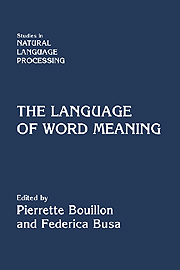Book contents
- Frontmatter
- Contents
- List of Contributors
- Preface
- Introduction: Word Meaning and Creativity
- Part I Linguistic Creativity and the Lexicon
- Part II The Syntax of Word Meaning
- 6 Introduction
- 7 Type Construction and the Logic of Concepts
- 8 Underspecification, Context Selection, and Generativity
- 9 Qualia and the Structuring of Verb Meaning
- 10 Sense Variation and Lexical Semantics: Generative Operations
- 11 Individuation by Partitive Constructions in Spanish
- 12 Event Coreference in Causal Discourses
- Part III Interfacing the Lexicon
- Part IV Building Resources
- Index
8 - Underspecification, Context Selection, and Generativity
Published online by Cambridge University Press: 07 October 2011
- Frontmatter
- Contents
- List of Contributors
- Preface
- Introduction: Word Meaning and Creativity
- Part I Linguistic Creativity and the Lexicon
- Part II The Syntax of Word Meaning
- 6 Introduction
- 7 Type Construction and the Logic of Concepts
- 8 Underspecification, Context Selection, and Generativity
- 9 Qualia and the Structuring of Verb Meaning
- 10 Sense Variation and Lexical Semantics: Generative Operations
- 11 Individuation by Partitive Constructions in Spanish
- 12 Event Coreference in Causal Discourses
- Part III Interfacing the Lexicon
- Part IV Building Resources
- Index
Summary
Abstract
The idea that semantic representations are underspecified, that is more abstract than the specific interpretations obtained in various contexts, is by now current in lexical semantics. However, the way in which underspecified representations give rise to more precise interpretations in particular contexts is not always clear. On one view, context provides missing information, for instance because it contains salient entities that can be referred to. I consider here the symmetric dependency, in which lexical elements impose certain semantic profiles to the contexts they fit in. I show that, although they are highly underspecified, those profiles cannot be reduced to a general semantic frame, unlike what is proposed in Pustejovsky's Generative Lexicon, and that their semantic adaptability reflects the highly abstract and similarity-based character (vagueness) of the predicates that help to define them.
Introduction
Recent work about the relation between lexical items, context, and interpretation has highlighted two notions of underspecification (see van Deemter and Peters, 1996 for various points of view). In some approaches, underspecification amounts to code ambiguities in an efficient way, to avoid carrying a set of alternatives during the interpretation process (Reyle, 1995). In the domain of the lexicon, underspecification sometimes takes the form of information enrichment.
- Type
- Chapter
- Information
- The Language of Word Meaning , pp. 124 - 148Publisher: Cambridge University PressPrint publication year: 2001
- 1
- Cited by

